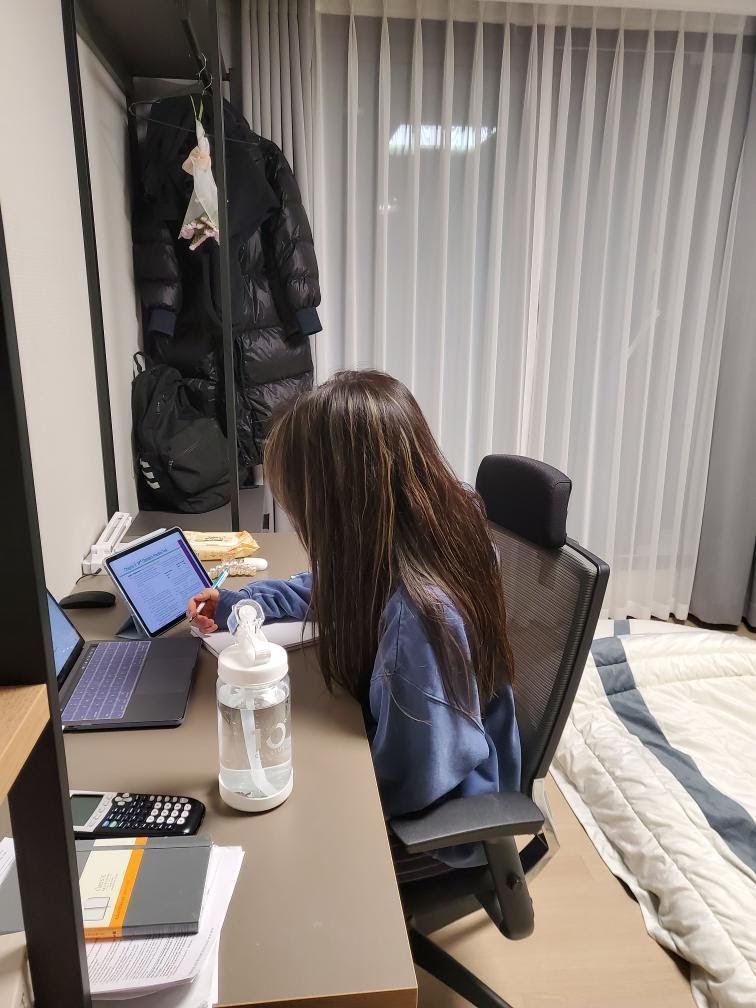Like most students this year, senior Regina Lee logs onto Canvas and to look for the Zoom link that starts her first class of the day.
Unlike most students, Lee begins her school day at 1:30 a.m., a result of attending SHS from her current home of South Korea.
She is one of dozens of students who have been taking classes during family vacations or longer stays away from Saratoga during the pandemic. Since the start of the second semester, Lee and her family have relocated due to her father’s work.
This means that from 1:30 to 6:30 a.m., Lee is in online class, and from 6:30 a.m. to 12:30 p.m., she catches up on sleep. From 1:30 to 5 p.m., she has free time, which she often uses to go out; from 7 to 8 p.m., she works out; and from 9 p.m. to 1 a.m., she completes homework and studies.
While her new sleep schedule appears daunting, Lee found that managing time, rather than trying to adapt to a new sleep schedule, was more difficult to overcome.
“I usually did homework right after classes when I was in the U.S., but now I have to keep track of all my assignments and their timelines, which is another difficulty,” Lee said.
While managing her assignments is a downside of learning abroad, Lee has discovered some benefits. Lee has found that her social life actually improved in her new circumstances. She is still able to easily communicate with her American friends over FaceTime and chats, much like other students at SHS have been doing. At the same time, she has also been able to reconnect with Korean family and friends who she hasn’t been able to see for years.
Lee is unsure of when exactly she plans to return to the U.S., but is considering coming back to take AP tests that may be in-person. Until then, though, she is adapting to her new method of learning overseas.
Junior Garrick Zhang has also experienced the upsides and downsides of online learning from another location. In October, he took his classes virtually from St. Louis, Mo. where he was visiting family friends with his mother.
“I didn’t feel anything different at first since I stayed at home all the time,” Zhang said. “But later I found out that I could study APUSH right beside the Mississippi River, so that was pretty fun.”
Since Missouri runs on Central Standard Time, Zhang said that he was able to get up before class started and manage his time better as a result. His day usually started at 8 or 9 a.m. CST, where he would have a “nice warm breakfast” before heading off to his first two classes at 10:30 a.m. CST. Between third and fifth period, Zhang would eat lunch, and the rest of the day would be a mix of doing homework, studying and doing other activities at home.
“I wasn’t able to drive, so I was stuck at home all the time,” Zhang said. “Nothing was really that different.”
To keep in touch with friends, he used WeChat, a messaging app made by Chinese company Tencent. Garrick said his relationships with his friends remained relatively untouched.
“Even in California my parents wouldn’t let me hang out with friends anyways,” Zhang said.
Albeit in different ways, both Lee and Zhang have been able to use the uniqueness of the pandemic to see family, travel and take advantage of online learning’s flexibility.
“I still stay connected with friends as I did mostly the same due to the pandemic,” Lee said. “I think my social life expanded in Korea with having close relatives and friends in Korea.”


























